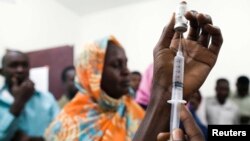Researchers in California have identified features of yellow fever that may lead to more effective treatment of the disease.
According to the World Health Organization, there are some 200,000 new cases of yellow fever each year, and about 30,000 victims die. The vast majority of cases are in sub-Saharan Africa, but the disease is also found throughout Latin America.
To learn more about the disease, Ilhem Messaoudi, associate professor of biological sciences at the University of California, Riverside, and colleagues studied yellow fever in rhesus monkeys.
In the first such study in two decades, the scientists looked at how yellow fever affected the immune system and also what was going on at the genetic level by analyzing DNA.
One thing they found was a big drop-off, soon after infection, in some white blood cells called lymphocytes, which are a key part of the body’s immune system.
“This could be one more test that we could run,” explained Messaoudi, “and it could give us another, an additional prognostic tool to say, ‘Hm, we should be a little bit more aggressive about treating this person.’”
Also, the researchers were surprised to find that some 800 genes are affected by the yellow fever virus. Many of those genes help regulate the immune system’s antibody production, and the virus suppressed them. And Messaoudi says that may also help doctors treating yellow fever patients.
“Those particular genes can help us, hopefully, come up with new therapeutics or maybe there are things within our own body that we can modulate or can change to help us be better prepared to respond better to this infection in the later stages.”
One of the next targets in yellow fever research is a better vaccine.
The current, live-virus yellow fever vaccine is very effective, but it’s not recommended for babies or older adults.
A co-author on the paper, Mark Slifka of Oregon Health & Science University, is working on a next-generation vaccine that could protect more people from getting yellow fever in the first place.
Messaoudi says she expects to test that new vaccine in rhesus monkeys.
Results of this research are published in the journal Proceedings of the National Academy of Sciences.





